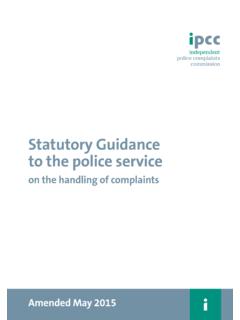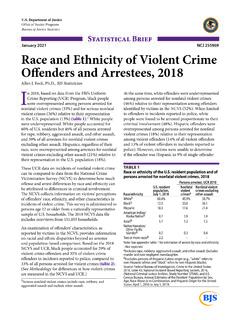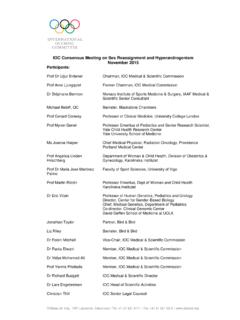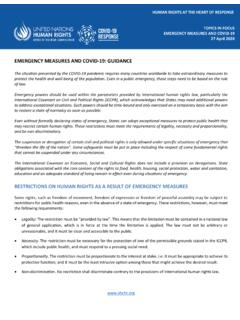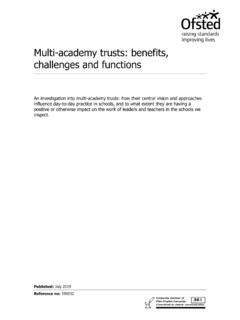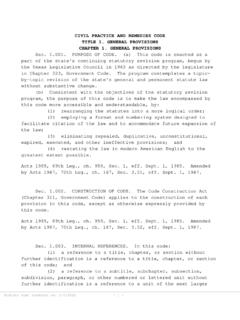Transcription of Statutory guidance on the police complaints system
1 Statutory guidanceon the police complaints systemStatutory guidance on the police complaints systemContentsChapter 1 Introduction .. 6 The Policing and Crime Act 2017: changes to the police complaints 6To whom the guidance applies .. 8 Other guidance and legislation .. 8 This guidance and key roles in the police complaints system delegation and responsibilities .. 9 How the guidance is arranged .. 11 Principles of the complaints systemChapter 2 Accessing the complaints system .. 15 The importance of an accessible system .. 15 Promoting access .. 15 Recognising and overcoming barriers .. 17 Complainants who may need additional 18 complaints made by young people under 18.
2 19 Chapter 3 Principles of reasonable and proportionate handling .. 20 The importance of reasonable and proportionate handling .. 20 What does reasonable and proportionate mean? .. 20 Principles of reasonable and proportionate handling .. 21 Chapter 4 Learning and improvement .. 24 Building a learning culture .. 24 Learning from complaints , investigations and reviews .. 25 Learning from wider sources .. 25 Using data to inform improvement .. 26 Making data available locally .. 27 Communicating the impact of learning .. 28 Initial handling of complaintsChapter 5 complaints .. 31 Definition of a complaint .. 31 What can be complained about? .. 31 Who can make a complaint?
3 32 complaints made on someone else s behalf .. 35 complaints falling outside of the police complaints system .. 352 Statutory guidance on the police complaints systemChapter 6 Initial handling and recording of complaints .. 36 Initial handling and recording of complaints .. 37 Action on receipt of a complaint .. 38 Handling complaints outside of Schedule 3 to the police Reform Act 2002 .. 40 Recording complaints .. 42 Handling complaints , recordable conduct matters and death or serious injury matters under Schedule 3 to the police Reform Act 2002 Chapter 7 Death or serious injury matters .. 47 Definition of a DSI matter .. 47 Recording a DSI matter .. 48 Chapter 8 Recordable conduct matters.
4 49 Definition of a conduct matter .. 49 Identifying conduct matters .. 50 Recording conduct matters .. 50 Recording conduct matters .. 51 Conduct matters involving allegations of discrimination .. 54 Referring a conduct matter .. 54 Chapter 9 Referrals .. 55 complaints that must be referred to the IOPC .. 55 Conduct matters that must be referred to the 56 Referral of death or serious injury (DSI) matters .. 56 Mandatory referral criteria .. 57 Definitions of referral criteria .. 58 Voluntary referrals .. 62 Matters which the IOPC requires to be referred to it ( call in ) .. 63 IOPC power to treat matters as having been referred ( power of initiative ).
5 63 Deadlines for referral .. 64 Notification of referral .. 66 Determining whether and how a matter should be investigated .. 66 Notification of mode of investigation decisions .. 67 Chapter 10 Deciding how to handle a matter under Schedule 3 to the police Reform Act 2002 .. 68 Requirements to take a reasonable and proportionate approach .. 68 Matters that must be investigated .. 68 Exceptions to the duty to investigate complaints .. 71 Assessing what is reasonable and proportionate .. 72 Statutory guidance on the police complaints system 3 Chapter 11 Duties and considerations relevant to all handling under Schedule 3 to the police Reform Act 2002 .. 73 Appointment of a person to handle the matter.
6 73 police witnesses .. 74 Communicating with the complainant and other parties .. 74 Exceptions to the duty to provide information .. 75 Keeping an audit trail .. 77 Apologising when and where appropriate .. 77 Criticism .. 78 Chapter 12 Handling complaints under Schedule 3 to the police Reform Act 2002 otherwise than by investigation .. 79 Taking a flexible approach .. 79 Deciding to take no further action .. 80 Chapter 13 Requirements when investigating .. 82 Investigations .. 82 Appointment of a person to carry out the investigation .. 82 Terms of reference .. 84 complaints relating to investigations of death or serious injury matters .. 84 Death or serious injury matters becoming conduct matters.
7 85 Special procedures .. 86 Severity assessments .. 87 Notices of investigation and providing terms of reference .. 90 Representations to the investigator .. 91 Accelerated procedures .. 92 Suspension of police officers and special constables .. 94 Conducting an investigation .. 94 Early referral to the CPS .. 96 Timeliness of investigations .. 97 Chapter 14 Concluding an investigation .. 100 The investigation report .. 100 Who owns the report .. 100 The content of an investigation report .. 101 Submission of the report .. 103 Chapter 15 Suspending and resuming handling .. 105 Power to suspend an investigation or other handling .. 105 Resumption after criminal proceedings.
8 107 Chapter 16 Dealing with withdrawn complaints .. 109 Notification required .. 109 Whether the complaint should be treated as a recordable conduct matter .. 1094 Statutory guidance on the police complaints systemOutcomes of handlingChapter 17 Outcomes following an investigation or other handling under Schedule 3 to the police Reform Act 2002 .. 113 Reasonable and proportionate outcomes .. 113 Action on receipt of an investigation report of a DSI matter local, directed and independent investigations .. 120 Action on receipt of an investigation report of a complaint or recordable conduct matter local investigations .. 121 Action on receipt of an investigation report of a complaint or recordable conduct matter directed investigations.
9 124 Communicating the outcome .. 127 Chapter 18 Reviews .. 131 The right of review .. 131 Who is the relevant review body ? .. 132 Delegation by the local policing body of the consideration of reviews .. 133 Receiving an application for review .. 133 Validity .. 134 Conducting the review .. 137 Outcome of the review .. 139 AnnexesAnnex A Supplementary guidance on handling matters about the actions of chief officers .. 147 Appropriate authority .. 147 Initial handling and recording of complaints .. 148 Recording of conduct matters .. 148 Referrals .. 149 Handling of matters under Schedule 3 to the police Reform Act 2002 .. 150 Reviews and the relevant review body .. 151 Annex B Supplementary guidance on handling matters related to persons who are no longer serving with the police .
10 152 Handling of matters where the person ceased serving on or after 15 December 2017 .. 152 Handling of matters where the person ceased serving before 15 December 2017 .. 166 Where a person ceases to serve during the handling of a matter .. 166 Statutory guidance on the police complaints system 5 Flowcharts .. 168 complaints .. 168 Recordable conduct matters .. 169 DSI matters .. 170 Relevant review body test .. 171 Reviews by local policing bodies .. 172 Glossary .. 1736 Statutory guidance on the police complaints systemChapter The Independent Office for police Conduct (IOPC) has a Statutory duty to secure and maintain public confidence in the police complaints system in England and Wales and to ensure that it is efficient and effective.
